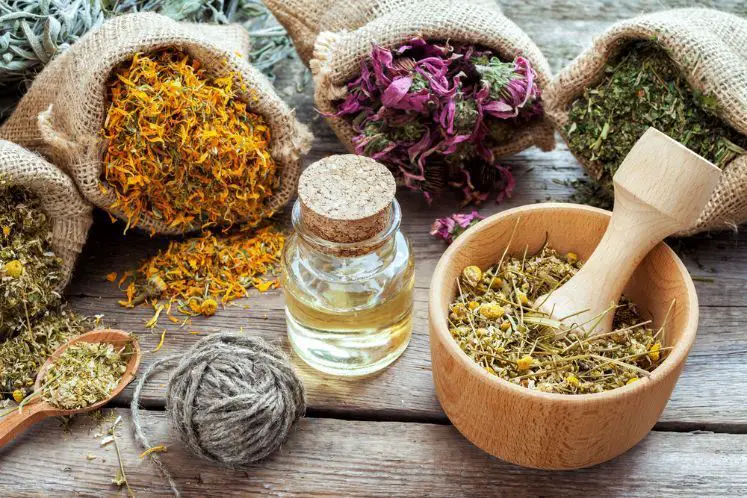Inflammation refers to the body’s immune response to infection or injury [1].
It is the body’s way of eliminating harmful pathogens such as viruses and bacteria to prevent them from entering the body and causing infection [2]. It also helps initiate repair of tissues in cases of injury [3].
These circumstances trigger what is called acute inflammation, which is actually beneficial as it promotes healing [1].
Chronic inflammation, on the other hand, is not at all helpful. Using essential oils is a good way to tackle this issue.
Chronic inflammation is a result of the body attacking its own healthy tissues, leading to various ailments such as arthritis, asthma, inflammatory bowel disease (IBD), and many more [1].
Clinical evidence reports that some essential oils are potent source of natural anti-inflammatory properties.
Whether you’re suffering from acute or chronic inflammation, you can find relief from these versatile essential oils.
13 Best Essential Oils for Treating inflammation
1. Chamomile Oil
Herbal preparations made with chamomile oil extract have long been used to treat several minor illnesses including inflammation [2].

It works by inhibiting four types of enzymes that trigger the body’s inflammatory process [2].
Evaluated in the study are human cytochrome P450 enzymes such as CYP1A2, CYP2C9, CYP2D6 and CYP3A4 [2].
Active compounds in chamomile extract namely chamazulene and alpha-bisabolol are particularly effective in suppressing these inflammatory enzymes [2].
Another way it works is by reducing the production of nitric oxide [3].
Its mechanisms are similar to a non-steroidal anti-inflammatory medication [4].
All these findings suggest that chamomile is a potential alternative treatment to inflammatory diseases.
What You’ll Need:
- 10 drops of chamomile oil
- 1/2 cup of organic cream or 1 bowl of hot water
Recommended Directions:
- Combine chamomile oil and organic cream.
- Apply on inflamed areas of the skin.
- If inflammation occurs in the airways, pour chamomile oil in a bowl of hot water.
- Inhale the steam.
- Repeat remedy twice a day for one to two weeks.
2. Lavender Oil

Lavender’s anti-inflammatory properties have been widely used in folk medicine in Iran and Morocco [5, 6].
It also has analgesic effects, which can come in handy since inflammation is often accompanied by pain [5].
One study points out that lavender works in a similar way as anti-inflammatory drug indomethacin [6].
Because this one is a natural remedy, it may have fewer side effects than the medication.
Contributing to this mode of action are its chemical constituents linalool and linalyl acetate [7].
The ability of lavender to induce relaxation also comes in handy.
People suffering from unpleasant symptoms such as pain and inflammation usually have higher levels of stress, and are unable to get a good night’s sleep.
Inhalation of lavender oil can help them relax and sleep better despite what they’re feeling.
What You’ll Need:
- 10 drops of lavender oil
- 1 bowl of water
Recommended Directions:
- Add lavender oil to water.
- Inhale the steam.
- Follow procedure twice a day.
- For cases of skin inflammation, use mixture to wash affected area.
- Repeat twice a day until problem subsides.
RELATED: 11 Health Benefits of Lavender Oil That You Should Know
3. Eucalyptus Oil
An herbal plant best known for its cooling effects, eucalyptus is another popular remedy for pain and inflammation.
Results from an experiment done by Brazilian researchers demonstrate how eucalyptus oil impedes paw edema in rats [8].
This oil tones down inflammation by inhibiting the formation of nitric oxide [9].
It also produces analgesic effects useful for curbing the pain that comes with inflammation [8].
When you apply it on the skin, it leaves a cooling sensation that helps numb the pain.
On the other hand, when you inhale it, it works by soothing the airways.
It’s very useful for respiratory related inflammation such as asthma and bronchitis, among others [9, 10].
Using eucalyptus not only tones down the swelling of the bronchial tubes, it also eliminates chest congestion and difficulty in breathing.
What You’ll Need:
- 5 drops of eucalyptus oil
- 1 tablespoon of jojoba oil
- 10 drops of eucalyptus oil
- 1 bowl of hot water
Recommended Directions:
- Dilute eucalyptus oil in jojoba oil.
- Dip a clean cloth into the oil mixture.
- Tap the cloth gently on the affected area of the skin, or on the throat for cases of tonsillitis.
- Do this technique two to three times a day for one to two weeks.
- Alternatively, inhale the steam from hot water poured with eucalyptus oil.
- Repeat this remedy twice a day for one week.
RELATED: 11 Home Remedies for Bronchitis to Soothe Your Cough
4. Rosemary Oil
The leaves of rosemary have been found to have a diverse array of pharmacological properties.
It is a potent diuretic, expectorant, carminative, and anstispasmodic, among many others [11].
It’s no wonder this herbal remedy has been used since the time of ancient folk healers to cure numerous ailments.
Rosemary essential oil, meanwhile, has been proven to be a potent anti-inflammatory and antinociceptive [11].
Its ability to reduce inflammation can be attributed to the presence of bioactive compounds such as rosmarinic acid, betulinic acid, carnosol, and ursolic acid [12, 13].
As a pain reliever, meanwhile, it works by blocking the pain signals in your brain.
This means that even if you’re in pain, the brain will not recognize the signals for it so you are not going to feel the pain sensation.
What You’ll Need:
- 20 drops of rosemary oil
- Bath water
Recommended Directions:
- Add oil to warm bath water.
- Soak in the bath half an hour.
- Be sure to inhale the steam.
- Repeat once a day for one to two weeks.
5. Ginger Oil
One of the many ailments ginger can cure is inflammation.
With its phenols such as gingerol, shogoal and paradol, it can tone down various inflammatory diseases [14].
Several studies confirm ginger oil’s ability to reduce inflammation in animal models [15, 16, 17].
Researchers from Naples, Italy noted that this oil is capable of decreasing carrageenan-induced paw swelling in mice [15].
These findings support the traditional use of ginger for diseases that bring pain and inflammation.
It was also uncovered during these studies that ginger can also alleviate other common symptoms and medical conditions such as fever, bacterial infection, high blood sugar and high cholesterol [15, 16, 17].
If the inflammation is caused by a bacterial infection, ginger can also get to the bottom of the problem to stop it for good.
What You’ll Need:
- 5 drops of ginger oil
- 1 tablespoon of liquid lanolin
- 1 cup of hot water
Recommended Directions:
- Mix ginger oil with lanolin.
- Use this to massage inflamed areas of the skin.
- For internal inflammation, pour ginger oil in a cup of hot water.
- Drink the concoction once a day until problem is cured.
RELATED: 10 Health Benefits of Ginger Oil That You Should Know About
6. Frankincense Oil
Frankincense is an oleo-gum-resin obtained from a tree commonly found in the hills of India [18].
There’s a long list of ailments that can be cured with frankincense, and these include asthma, arthritis, psoriasis, and even cancer [18].
That’s because frankincense has a vast array of pharmacological effects, including as a potent anti-inflammatory and analgesic agent, as proven in various studies [19, 20, 21, 22].
A Japanese study reports that its active components, boswellic acids are particularly effective in treating inflammatory diseases such as rheumatoid arthritis [19].
These compounds inactivate the pro-inflammatory cytokines and mediators which trigger the onset of inflammation [22].
They also hinder the production of nitric oxide as well as the activity of pro-inflammatory enzymes [22].
All these make them a viable treatment even for chronic cases of inflammation [22].
What You’ll Need:
- 7 drops of frankincense oil
- 1 tablespoon of olive oil
Recommended Directions:
- Add frankincense oil to olive oil.
- Use this mixture to massage affected areas.
- Repeat once daily for one to two weeks.

RELATED: 10 Proven Home Remedies for Psoriasis
7. Sage Oil
Plants from the genus Salvia such as sage are grown in different parts of the world for culinary and curative purposes [23].
Salvia species are known for being an effective analgesic, muscle relaxant and sedative [23].
Sage can also be used for toning down inflammation.
It was proven successful in decreasing Croton oil-induced ear oedema in mice, as reported in a
2001 study that can be found in the Journal of Ethnopharmacology [24].
Its anti-inflammatory actions are due to the presence of ursolic acid, which is twice more potent than indomethacin [24].
This means that sage is a great way to eliminate the distressing symptoms that typically take place during the course of illness.
It’s a quick and cost-effective way to feel better while sick.
What You’ll Need:
- 2 tablespoons of olive oil
- 6 drops of sage
Recommended Directions:
- Blend oils in a jar.
- Apply gently on inflamed parts of the skin.
- Do this technique twice a day for two weeks.
8. Sandalwood Oil
Commonly grown in the southern parts of India, Sandalwood is traditionally used to treat fever and headache [25].
It is also typically used as a stimulant, antiseptic and diuretic [25].
On top of all these, sandalwood is also a strong anti-inflammatory and analgesic agent in various doses, states a study published in the Planta Medica Journal [25].
Its maximum effect was observed at 500 mg/kg [25].
Researchers also noted that its effects were comparable to that of Diclofenac sodium [25].
This makes it ideal for treating different kinds of inflammatory disorders.
What You’ll Need:
- 20 drops of sandalwood
- Warm bath water
Recommended Directions:
- Pour oil into bath water.
- Sit in the bath for one hour.
- Repeat daily for two weeks.
9. Holy Basil Oil
The medicinal value of holy basil is well-established in scientific research, as it is a proven safe and effective treatment for asthma, diarrhea, bronchitis, fever, arthritis, and skin infections [26].
It is also known to possess antifungal, antimicrobial, antispasmodic and anti-cancer properties [26].
Researchers validate its folkloric use for inflammation through animal models subjected to paw edema tests [27, 28].
Holy basil has been found to have the ability to inhibit paw swelling induced by arachidonic acid and leukotriene [27].
It is reported to block the pathways of inflammation with its dual inhibitory effects on arachidonate metabolism [27].
Its actions can be compared to that of sodium salicylate [28].
What You’ll Need:
- 3 drops of basil oil
- 1 teaspoon of sweet almond oil
Recommended Directions:
- Combine the two oils.
- Gargle the solution for three minutes.
- Repeat twice a day to tone down inflammation in the mouth or throat
10. Thyme Oil

Another practical remedy for inflammation is thyme oil.
Apparently, this herb does more than add flavor and aroma to dishes.
A 2004 study confirms that thyme has significant anti-inflammatory effects when topically applied [29].
According to the findings, its topical anti-inflammatory activity is only three times lower than indomethacin [29].
Like other herb oil extracts, thyme also works by stopping the production of nitric oxide [30].
Responsible for triggering these actions are its active compounds such as thymol and carvacrol [31].
Researchers from Brazil arrived at this conclusion after using various experimental models, which include carrageenan-induced pleurisy, ear edema and chemotaxis [31].
Thyme appeared to have inhibitory effects on edema and migration of inflammatory leukocytes [31].
Simply put, thyme oil stops the process of inflammation by suppressing the mediators that set off this process.
What You’ll Need:
- 5 drops of thyme oil
- 1 cup of hot water
Recommended Directions:
- Add thyme oil to hot water.
- Drink the concoction once a day until condition improves.
11. Turmeric Oil
Turmeric is known far and wide for its excellent therapeutic effects.
Its active component called curcumin is a proven anti-inflammatory agent, which has long been used for managing rheumatoid arthritis and other inflammation-related disorders.
In Japan, scientists probed the link between an inflammatory cytokine called interleukin (IL)-6 and rheumatoid arthritis [32].
They discovered that turmeric’s curcumin worked by suppressing this inflammatory enzyme [32].
It is concluded that turmeric oil can definitely relieve pain and inflammation caused by arthritis [32].
What You’ll Need:
- 1 cup of water
- 1 cup of coconut milk
- 1 tablespoon of honey
- 1 tablespoon of ghee
- 2 drops of turmeric oil
- 1 teaspoon of turmeric powder
Recommended Directions:
- In a saucepan over low heat, warm coconut milk and water for two minutes.
- Add honey, turmeric powder and butter.
- Simmer for two more minutes.
- Transfer liquid into a glass pitcher.
- Stir in turmeric oil.
- Drink the mixture twice a day for one to two weeks.
12. Myrrh Oil
Like turmeric, myrrh is also commonly employed as treatment for arthritis.
In a study featured in the Scientific Reports, it was reported that myrrh was especially effective when combined with another anti-inflammatory agent, which is frankincense [33].
When used in combination, these two oils control the inflammatory process, and relieve the intensity of joint pain and swelling [33].
The participants who were given with the myrrh and frankincense combination recovered more quickly from arthritis than the group given a placebo [33].
What You’ll Need:
- 3 drops of myrrh
- 3 drops of frankincense
- 1 teaspoon of almond oil
Recommended Directions:
- Put these oils in a bowl, and mix well.
- Apply a thin layer on the skin.
- Gently massage for three to five minutes.
- Use this remedy several times a day until inflammation subsides.
RELATED: 11 Health Benefits of Myrrh Oil (Backed by Scientific Evidence)
13. Orange Oil
It’s true that inhaling orange oil and other citrus scents can make you feel more alert and energetic.
This is just one of the many benefits of this wonder oil.
A 2009 experiment published in the European Journal of Medical Research stated that out of all the essential oils assessed for their anti-inflammatory activities, orange oil was the most powerful [34].
The process by which is works is that it reduces the release of inflammatory cytokines as well as reactive oxygen species [34].
Orange oil is therefore described as a highly effective and safe treatment for arthritis and other inflammatory diseases [34].
What You’ll Need:
- 3 drops of orange oil
- 1 teaspoon of avocado oil
Recommended Directions:
- Combine the two oils.
- Spread oil mixture on affected parts of the skin.
- Massage for a few minutes.
- Repeat remedy three times a day for one to two weeks.
Bottom Line
Both acute and chronic inflammation can bring unpleasant symptoms that you’d want to get relief from.
You may feel better by using these practical and safe essential oils for inflammation relief.
However, essential oil remedies are not alternatives to medical treatments. You are recommended to visit a doctor if inflammatory symptoms are persistent.
READ NEXT: Top 12 Anti-Inflammatory Herbs That You Should Know About






